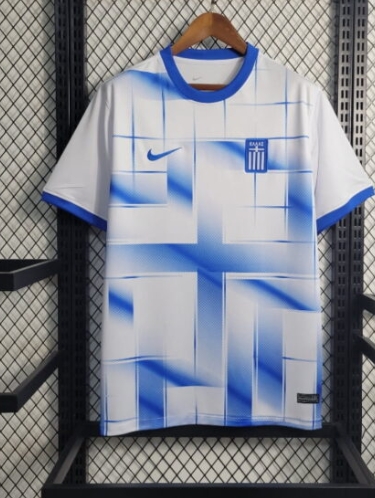greece soccer jerseys football YUPOO china B2B2C Wholesale Supplier Branded national greece soccer jerseys retro shirts, join us on whatsapp | Yupoo fashion national greece soccer jerseys players jerseys football retro jerseys reseller online store , Yupoo jerseys Replica top version for yupoo wholesale drop shipping jerseys to worldwide.
Greece has a rich and intricate history in football that reflects the country’s passion for the sport, its unique cultural heritage, and its political challenges. Football, or soccer as it is known in some parts of the world, has become a fundamental aspect of Greek society, uniting communities, and fostering national pride. This overview will cover the evolution of football in Greece, its significant achievements, its impact on society, and the development of the national team.
Football was introduced to Greece in the late 19th century, around the 1870s, by the British expatriates who lived in the country, particularly in areas such as Athens and Thessaloniki. The first football clubs emerged during this period, with the establishment of Athens Football Club in 1896 and Aris Thessaloniki in 1914. These clubs began to cultivate local interest in the sport, leading to the formal organization of competitions.
In 1926, the Hellenic Football Federation (HFF) was founded to govern the sport’s activities in Greece, organizing leagues, tournaments, and national competitions. The first official league, the Alpha Ethniki, later known as Super League Greece, was established in 1959 and has since been the top tier of Greek football.
The mid-20th century is often regarded as a golden age for Greek football, as the national team and domestic clubs began finding success on both domestic and international stages. Clubs such as Olympiacos, Panathinaikos, and AEK Athens emerged as dominant forces in Greek football, regularly competing and winning national titles.
During this period, Greek clubs started to perform well in European competitions. Panathinaikos reached the final of the European Cup in 1971, making history as the first Greek team to reach such heights. They faced Ajax in the final but were defeated 2-0. This performance not only elevated Greek football’s status in Europe but also inspired ambition among other clubs.
In 1987, Olympiacos claimed victory in the European Cup Winners’ Cup, further cementing Greece's growing reputation in the footballing world. However, despite the successes of clubs, the national team struggled to replicate this success on the international stage throughout these decades.
The Greek national team faced numerous challenges in its early years, participating in various qualification campaigns for the FIFA World Cup and UEFA European Championship but failing to qualify for many tournaments. The late 1990s and early 2000s saw Greece in a transitional period, characterized by inconsistency and a lack of competitive success.
Despite these struggles, the national team began to show promising signs of improvement. The introduction of new talent and a renewed focus on building a competitive squad would lay the groundwork for future success.
The turning point for Greek football came in 2004 during the UEFA European Championship held in Portugal. The national team, under the management of Otto Rehhagel, entered the tournament as underdogs with few expectations. The team’s tactical discipline and cohesive teamwork led to a series of stunning upsets.
Greece started the tournament by defeating Portugal 2-1 in the opening match, showcasing resilience and determination. They advanced through the group stages and faced strong opponents in the knockout rounds, including a dramatic victory over France in the quarterfinals (1-0) and a remarkable win against the Czech Republic in the semifinals (1-0) with a late goal.
On July 4, 2004, Greece faced Portugal in the final, once again at Estádio da Luz in Lisbon. In a remarkable display of defensive prowess and strategic gameplay, Greece secured a 1-0 victory, clinching their first major international trophy. Angelos Charisteas scored the decisive goal, and the triumph not only brought joy to the nation but also fundamentally changed the perception of Greek football both domestically and internationally.
Following the euphoric victory at Euro 2004, the Greek national team endeavored to maintain its competitive edge. They qualified for the 2006 FIFA World Cup in Germany, but their campaign was disappointing as they exited in the group stage without winning a match. The failure to replicate the success of Euro 2004 was a jarring reminder of the challenges faced in international competitions.
The team continued to see ups and downs in the following years. Greece qualified for Euro 2008 but struggled, finishing last in their group. However, improvements in youth development and scouting programs began to take shape, setting the stage for future generations of players.
In the years after Euro 2004, Greek clubs continued to perform well in European competitions. Olympiacos, AEK Athens, and
